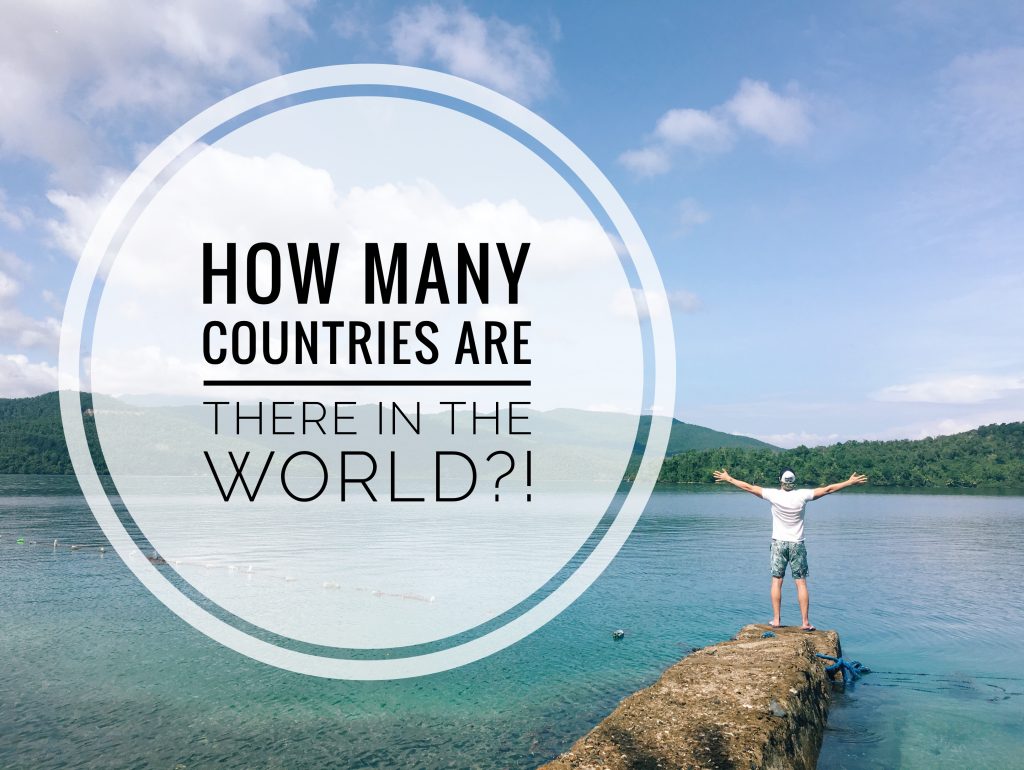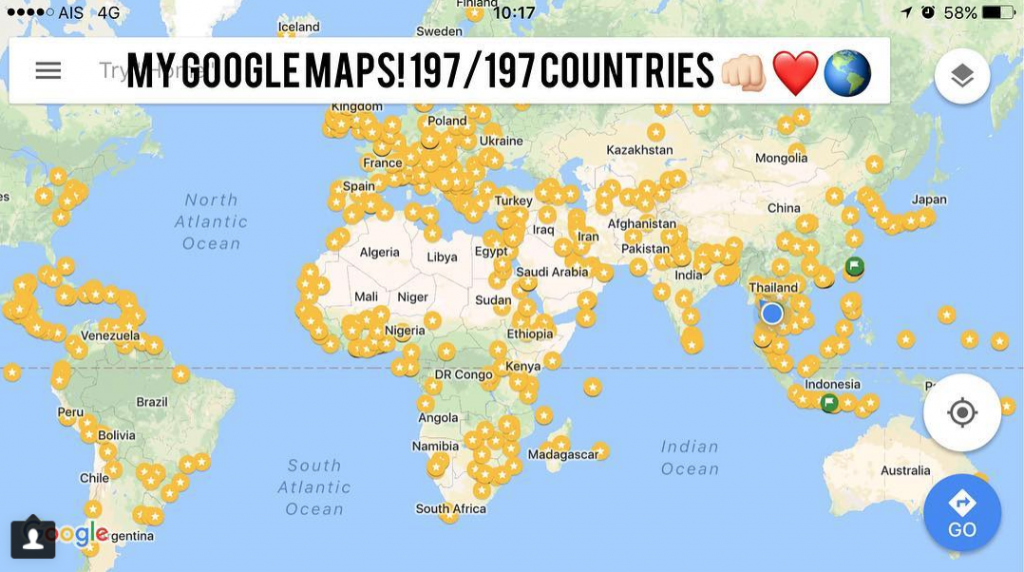How many countries in the world in 2025?
UPDATED JANUARY 2025: If you ask how many countries in the world are there in 2024. Well, the answer is that technically speaking there are 197 countries in the world. From a travel perspective, you could argue there are 215 countries. I’ve visited them all! Although it’s pretty complicated, so let’s have a look.
My attempts at visiting every country in the world was a thousand times tougher than I ever expected. Before I could contemplate finishing the goal, I had to sit back and answer my own question. ‘How many countries are there in the world?“. “200 or so?’ I thought. It’s so tough to get a definitive answer. Bear with me.
Generally speaking, I was right. There are around 200 countries in the world. But ‘generally’ doesn’t cut it when you’re trying to become one of the few people to officially do it! So I had to delve a little deeper. And the answer to how many countries in the world was found somewhere from the United Nations list (193 recognised countries) and the FIFA football list (211 members). But how can you put an official number on it?

Table of contents
- How many countries in the world in 2025?
- What is a country? What makes a country a country?
- How Many Countries in the World? What Does FIFA Say?
- THE UNITED NATIONS SAY THERE ARE 193 COUNTRIES IN THE WORLD
- So there are 197 countries in the world?
- So here’s the full list of EVERY COUNTRY IN THE WORLD*
- If you want to know about how many countries in each of the 7 continents, check these out:
- How many countries are there in Africa? 54
- How many countries are there in North America? 23
- How many countries are there in South America? 12
- How many countries are there in Europe? 49
- How many countries are there in Asia? 49
- How many countries are there in Australia? 23
- How many countries are there in Antarctica? 0
- Finally, how many continents are there ? 7!
- And how many countries in each region?
- So 197 countries? Or 215?
- Disputed territories Around the World
- What about the UK? Is England a country? Northern Ireland? Wales? Scotland?
- Places that aren’t countries (that people often think ARE)
- So, how many countries in the world? 197 (on a technicality), 215 to be sure.
- Lastly, my journey to every country in the world, and where I am now:
- Further reading on country stuff?
What is a country? What makes a country a country?
First of all, we need to think about what makes a country a country. Does it have to have a flag, a government, its own currency, a passport? It’s so difficult to decide. So let’s say this: an independent country is not only a self-governed nation with its own authorities. Furthermore, its status needs the international diplomatic recognition of sovereignty from at least some other sovereign countries. So you need to manage all your own affairs AND have other countries understand and recognise that you are indeed a country. Which stops me from declaring my apartment ‘johnnyland’ and it being an official country. Shame.

How Many Countries in the World? What Does FIFA Say?
Initially, being a huge football fan, I wanted to ask FIFA how many countries are there in the world. And then I could work off the FIFA list But as much fun as that would have been, it was just plain wrong. Football has more national teams than any other sport so that’s a great starting point too. And the federation ‘FIFA’ is a huge global body.
FIFA says there are 211 countries “and territories” across the world. So you see the issue here!
But, alas, politics still plays a part. For example, the UK is 1 country but FIFA used Northern Ireland, England, Scotland and Wales as 4 separate ‘countries’. Despite all using the same British pound, same British passport, having the same British queen and all using the same British Government (albeit slightly differently). So without getting political (and coming from Northern Ireland that’s quite tough) the FIFA list isn’t strictly correct. So, scratch that. Onto the next one. The United Nations.

THE UNITED NATIONS SAY THERE ARE 193 COUNTRIES IN THE WORLD
The United Nations list is probably the best to work off. It’s pretty expansive. It’s not TOO political (more on that in a second). And if you’re recognized by the UN then realistically you’re pretty much a country. So they say they have 193 members. So that means there are 193 countries in the world, right? Not quite. The 193 United Nations list doesn’t include Kosovo, Palestine, Vatican City, or Taiwan.
Are Palestine and the Vatican City countries? Yes.
The UN also sees 2 permanent observer states in Palestine and Vatican City. Both of which I see as countries. Palestine, in particular, is one of my favorites. So that would make the count 193 + 2 = 195. So 195 countries in the world? Calm down sailor, we’re not there yet. That list still excludes Taiwan (recognized by 22 countries), and Kosovo (recognized by 109 other countries), so what to do?
Is Taiwan a country? Yes.
Taiwan is excluded because China claims ownership over Taiwan. The rest of the world doesn’t want to harm their relations with China due to all the trading opportunities and power, so they too cut ties in terms of recognising Taiwan as an independent country. Despite the fact that very much is a country. So that makes the final cut for sure. Incidentally, Taiwan is a brilliant place to visit, I’d massively recommend it.
Anyway, that brings us to 196 countries in the world. UN’s 193 countries list + Kosovo + Palestine, and now + Taiwan.
Is Kosovo a country? Yes.
Kosovo is a country. But it’s a political issue too. Since declaring itself independent from Serbia in 2008 it’s had a tough ride. Again without getting overly political, it’s recognized by countries such as the UK, Germany, Canada, Australia, New Zealand, Norway, Sweden, Denmark, and a lot more As well as being a member of the IMF, The World Bank, the IOC etc. Yet the countries that don’t recognize it includes Iraq, Iran, Angola, Kazakhstan, Turkmenistan, Mali, Nigeria, Russia, Syria and Sudan, so I have gone with including it in my list and I personally recognize Kosovo as a country, so that makes 197 countries in the world!

So there are 197 countries in the world?
Yes, kind of. There are 197 countries in the world if you are aligned with the technical aspects of things alone, rather than a practical sense. Can you say you’ve been to every country when you have that big block of Greenland on a map, staring back at you, chanting “you cheated and you know it, we’re not really Denmark“. Bearing that in mind, there are 197. But in the sense of pure travel, it’s more.

So here’s the full list of EVERY COUNTRY IN THE WORLD*
*according to the technical 197 country list that I initially visited, in the order I visited them:
- Republic of Ireland
- UK
- France
- The Netherlands
- Belgium
- USA
- Canada
- Thailand
- Laos
- Cambodia
- China
- Bangladesh
- India
- Nepal
- South Korea
- Vietnam
- Malaysia
- Singapore
- Japan
- The Philippines
- Brunei
- Indonesia
- East Timor
- Australia
- Sri Lanka
- Zimbabwe
- Zambia
- Botswana
- South Africa
- eSwatini/Swaziland
- Mozambique
- Malawi
- Tanzania
- Kenya
- Uganda
- Rwanda
- Ethiopia
- Somalia
- Djibouti
- Sudan
- Egypt
- Jordan
- Syria
- Lebanon
- Myanmar
- Taiwan
- North Korea
- Mongolia
- Russia
- Kazakhstan
- Finland
- Estonia
- Latvia
- Lithuania
- Belarus
- Ukraine
- Moldova
- Romania
- Bulgaria
- North Macedonia (previously Macedonia)
- Kosovo
- Greece
- Albania
- Montenegro
- Croatia
- Bosnia & Herzegovina
- Serbia
- Hungary
- Israel
- Palestine
- Italy
- Vatican City
- San Marino
- Switzerland
- Liechtenstein
- Slovenia
- Austria
- Slovakia
- Czech Republic
- Poland
- Germany
- Denmark
- Sweden
- Luxembourg
- Qatar
- Bhutan
- UAE
- Portugal
- Spain
- Andorra
- Monaco
- Iceland
- Papua New Guinea
- New Zealand
- Solomon Islands
- Vanuatu
- Fiji
- Tonga
- Samoa
- Kyrgyzstan
- Tajikistan
- Uzbekistan
- Iraq
- Maldives
- Iran
- Azerbaijan
- Georgia
- Armenia
- Turkey
- Malta
- Cyprus
- Mexico
- Belize
- Guatemala
- El Salvador
- Honduras
- Nicaragua
- Costa Rica
- Panama
- Brazil
- Uruguay
- Paraguay
- Venezuela
- Colombia
- Ecuador
- Peru
- Bolivia
- Argentina
- Chile
*Antarctica
- Suriname
- Guyana
- Trinidad and Tobago
- Grenada
- Saint Vincent and the Grenadines
- Saint Lucia
- Barbados
- Dominica
- Antigua and Barbuda
- St Kitts and Nevis
- Dominican Republic
- Haiti
- Cuba
- Bahamas
- Jamaica
- Bahrain
- Kuwait
- Algeria
- Tunisia
- South Sudan
- Democratic Republic of Congo
- Burundi
- Comoros
- Madagascar
- Seychelles
- Mauritius
- Lesotho
- Namibia
- Angola
- Republic of Congo
- Gabon
- Sao Tome and Principe
- Equatorial Guinea
- Cameroon
- The Central African Republic
- Chad
- Nigeria
- Benin
- Togo
- Ghana
- Ivory Coast
- Mali
- Burkina Faso
- Niger
- Liberia
- Sierra Leone
- Guinea
- Guinea-Bissau
- Senegal
- The Gambia
- Mauritania
- Morocco
- Cape Verde
- Libya
- Eritrea
- Afghanistan
- Turkmenistan
- Kiribati
- Tuvalu
- Marshall islands
- Nauru
- Palau
- Federated States of Micronesia
- Pakistan
- Oman
- Saudi Arabia
- Yemen
- Norway (COMPLETED MARCH 2017!)
So 197/197 countries of the world, I’ve kind of finished my goal. But you’re probably wondering where Greenland is? Where the British Virgin Islands are? This is where it gets a little tricky. So if you’ve only visited 197 countries, then have you really visited every country in the world? Not really, and here’s why!
If you want to know about how many countries in each of the 7 continents, check these out:
How many countries are there in Africa? 54
How many countries are there in North America? 23
How many countries are there in South America? 12
How many countries are there in Europe? 49
How many countries are there in Asia? 49
How many countries are there in Australia? 23
How many countries are there in Antarctica? 0
Finally, how many continents are there? 7!
And how many countries in each region?
- How many countries in Southeast Asia?
- And how many countries in Central America?
- How many countries in the Caribbean?
- Or how many countries in the the Pacific Islands?
- How many countries in the Middle East?
- How many countries in Scandinavia?
So 197 countries? Or 215?
IF YOU’RE GOING TO ARGUE THAT THERE ARE MORE THAN 197 COUNTRIES. THEN 215 IS PERHAPS MORE DEFINITIVE.
Why do some people say there are MORE than 197 countries in the world? Disputed territories! First up, 2 very dubious visits are included on my personal journey to every country in the world on my 197 list. And I feel like a bit of a fraud. Somalia and Iraq (EDIT 2025, I’ve since gone back and traveled them properly, check out the photos and blog posts below!).
Personally, I originally cheated on visiting Somalia by visiting Somaliland:
Somalia has an autonomous region in the north called Somaliland. Although not recognised by many nations, it’s in every way its own country. Passport, government, currency, culture, sports teams. It’s a political reason that it’s not more recognised but it’s as near to a country as it can be. Somaliland is the cheat mode all travelers who try to visit every country in the world use. Myself included. Shame on us.
EDIT 2024: In 2018, I traveled to Mogadishu, Somalia to make sure I traveled the ‘real’ Somalia, it was a crazy trip!

I cheated Iraq in Northern Iraq:
Next up, Iraq. Similar situation, but with different politics. Northern Iraq, an autonomous region in the north of Iraq isn’t really Iraq. Culturally it’s completely different. Legally it’s different in that you can fly in with no visa and get stamped in. Whereas, in Iraq proper, that’s not possible. They fly their flag proudly, drink Guinness at Irish pub quizzes at the weekend (to that, I can testify!). So I honestly don’t feel like a visit to Northern Iraqi is visiting Iraq. Technically perhaps, but travel shouldn’t be about passing by on a technicality. It should be about seeing the world, experiencing everything we can. And I kind of feel I’ve let myself down a little here.
*EDIT 2020: I was so keen to travel to Iraq, that last year I brought 16 of my blog readers with me to Baghdad, a great trip!

Disputed territories Around the World
Nothing is simple when defining what makes a country. For that reason, there are a lot of disputed territories around the world. Now while Catalonia may fight regularly for independence, they are still very much part of Spain so they certainly can’t be counted. Same for Scotland within the United Kingdom. Or Greenland, Svalbard or the Faroe Islands. This is not a political endorsement, just a simple fact.
However, the following territories have fully declared themselves independent (although those declarations aren’t officially ratified by most nations), and therefore not yet recognized by most of the rest of the world:
Somaliland
Declared its independence from Somalia in 1991. Not recognized as a country by any other country, officially still a part of Somalia proper. I had quite a crazy experience in Somaliland complete with terrorists, tycoons and prostitutes. I personally visited 2010.
Nagorno-Karabakh
Declared its independence in 1991. It isn’t recognized by any UN member states, and by only 3 UN non-members: Abkhazia, South Ossetia, and Transnistria. Officially part of Azerbaijan. .I personally visited 2013.
The Turkish Republic of Northern Cyprus
Declared its independence in 1983. It is only recognized by 1 UN member state, Turkey. Officially still part of Cyprus proper. I personally visited 2013.
Sahrawi Arab Democratic Republic/Western Sahara
Declared its independence in 1976. It is recognized by 47 UN member states (plus 37 additional member states who used to recognize it) as well as South Ossetia. Officially still part of Morocco proper. I personally visited 2015.
Transnistria/Pridnestrovian Moldavian Republic
Declared its independence in 1990. It isn’t recognized by any UN member states, and by only 3 UN non-members: Abkhazia, South Ossetia and Nagorno-Karabakh. Officially part of Moldova. I undertook a bit of Transnistria tourism a few years ago from Moldova. A fascinating place. I personally visited 2012
South Ossetia
Declared its independence in 1991. It is recognized by 4 UN member states (Russia, Nicaragua, Venezuela and Nauru) and 4 UN non-member states (Sahrawi Arab Democratic Republic, Abkhazia, Nagorno-Karabakh and Transnistria). Officially part of Georgia proper. I personally travel to South Ossetia in 2018.
Abkhazia
Declared its independence in 1999. It is recognised by 4 UN member states (Russia, Nicaragua, Venezuela and Nauru) and 3 UN non-member states (South Ossetia, Transnistria, and Nagorno-Karabakh). Officially part of Georgia proper. I personally visited 2018. I travel to Abkhazia a few years ago with my mum, from Georgia.
Northern Iraq and beyond
They have their own Regional Government, 32 countries have diplomatic relations in Erbil, a de facto Capital city ( in addition to the UN, EU, etc), they also have ’embassies’ in foreign nations around the world. To visit Northern Iraqi, it’s visa-free for most western nations, a different situation to Iraq proper where you need an Iraqi visa. It has its own flag, its own sports teams. It’s pretty much a country, not as strong a claim as Somaliland but still, to go to Northern Iraq and claim to have visited Iraq is a little weak. I’m guilty of that! (visited Northen Iraqi 2015, yet to visit Iraq proper) EDIT: I’ve now been to Iraq proper, and I took 16 of you guys with me!
Cook Islands
Cook Islanders are New Zealand passport holders, and New Zealand is officially responsible for the defense and foreign affairs of the Cook Islands (and Niue). However, these responsibilities confer New Zealand no rights of control per se. It is however recognized by 11 UN member states. As of 2016, the Cook Islands, Niue, and Kosovo are the only states that participate in UN specialized agencies, but which are not member or observer states of the UN itself.
Niue
Niueans are New Zealand passport holders, and New Zealand is officially responsible for the defense and foreign affairs of Niue (and the Cook Islands). However, these responsibilities confer New Zealand no rights of control per se. It is however recognized by 7 UN member states. As of 2016, the Cook Islands, Niue, and Kosovo are the only states that participate in UN specialized agencies, but which are not member or observer states of the UN itself.
What about the UK? Is England a country? Northern Ireland? Wales? Scotland?
And then, of course, you have the confusing, devolved situation of the UK with Northern Ireland (where I grew up), Scotland, England, and Wales. First, I must risk offending everyone by stating 4 facts:
- England is not a country.*
- Northern Ireland is not a country.*
- Wales is not a country.*
- Scotland is not a country.*
- The United Kingdom IS a country.
*This discussion can often be reduced to pedantics. What is a country vs a nation, for example? If we consider a country a sovereign state, then what I’ve said above holds true. If you consider a country to be anything that sees itself as a country, then you may consider it differently.
Here’s when we talk about technicalities. If you spend 1 day in London then technically you’ve visited all of the UK. But what about Northern Ireland for example? You’ve ‘ticked off’ Northern Ireland by visiting just the UK.
The UK is the country by definition, but the devolved situation is difficult, so from a travel standpoint, not a legal/technical one, you should really visit them all. Besides, Belfast is one of the best cities in the world, you HAVE to go there. Here’s how to spend 1 day in Belfast if you do go. It’s my home city!

Places that aren’t countries (that people often think ARE)
Furthermore, there are other places that lots of people consider countries but all belong to an actual sovereign member state.
- Hong Kong (rightly or wrongly, China – although to be honest I completely understand if people choose to include this as a separate country due to having its own passport, own currency, own political autonomy)
- Macau (China)
- Tibet (China)
- Northern Ireland, Scotland, England, Wales (the UK)
- French Guiana (France)
- Puerto Rico (US)
- Lots of the Caribbean (BVI, Guadeloupe, Aruba, USVI, Cayman Islands, Turks and Caicos, Anguilla, Saint Martin and more)
- Reunion Island (France)
- French Polynesia (France) – NOTE: On a personal level, Bora Bora is where I proposed to my long-suffering partner!
- American Samoa (US)
- Canary Islands (Spain)
- Madeira (Portugal)
- Faroe Islands (part of Denmark, visit the Faroe Islands if you get the chance, like Iceland without the tourists)
- Gibraltar (part of the UK)
- Greenland (part of Denmark, but please consider to Travel Greenland, a brilliant destination)
- The Arctic (belongs partly to Norway, Denmark, Canada, the US and Russia)
- The Falklands (part of the UK)
- Guam (US)
So, how many countries in the world? 197 (on a technicality), 215 to be sure.
That’s it, 197 is the technical number, (198 if you want to include Hong Kong) but if we add the 10 disputed territories, that makes 207. Then morally you’d be compelled to add Tibet, Hong Kong, Faroe Islands etc. So after far too many hours online, I’d say there is a solid argument for anyone either claiming to, or wanting to, visit every country in the world, for the 197 countries and these 19 guys:
- Somaliland
- Nagorno-Karabakh
- Northern Cyprus
- Western Sahara
- Transnistria
- South Ossetia
- Abkhazia
- Northern Iraq
- Tibet
- Hong Kong
- Macau
- Faroe Islands
- Greenland
- Northern Ireland
- Scotland
- England
- Wales
- Cook Islands
- Niue
Personally, I think Guam, Gibraltar (all places I’ve also visited for the record), French Guiana, etc are a push too far, and having a football team is about as far as the argument goes in regards to them being a country or not.
So with that in mind, that makes 197 + 19 additional nations (-1 for removing the UK and replacing with the 4 nations that make it up) = 215 countries.

My progress on the big list: 215/217
If Niue and Cook Islanders have New Zealand passports, and Faroe Islanders and Greenlanders have Danish passports then can they really be sovereign states? It’s tough, but having your own devolved Government, culture, autonomy, flag etc is certainly worthy. So now I’m looking at flights to Niue and the Cook islands like the travel freak I am. See you on the road I guess!
I live like this because I love to travel, though. Box-ticking and border-hopping for an hour, or a day, in a country isn’t for me. I mean, does that even really count? That’s transport, not travel. Sooooo, are there 215 countries in the world, and will I visit them all? I want to see the world, the WHOLE WORLD. I haven’t been to the Faroe Islands or Greenland (EDIT 2020 – I’VE NOW BEEN TO BOTH!), so can I ‘colour the map’ because I’ve been to Denmark? It doesn’t feel right.
So let’s give it a crack. 215 here I come. Of the 19 additional nations, I listed I’ve visited 17 of them on my travels already. so I need to go back to ‘correct’ my Iraq visit (EDIT 2025, DONE!), and then hit up the Cook Islands, and Niue and I’m actually finally done. No cheating involved!
Lastly, my journey to every country in the world, and where I am now:
I wrote a list of frequently asked questions about my journey to every country in the world. You can read that here. I’m now based in both Bangkok, where I bought a condo with the money I made from blogging Thailand, and Chiang Mai where I hope to start a family in the new dream house I’ve just built! My plans are to have a crazy schedule of being based in Thailand 6 months a year, then somewhere else 3 months a year, and traveling 3 months a year. Let’s see, but it’s been one hell of a ride so far!
Further reading on country stuff?
What are the least visited countries in the world?
What are the most visited countries in the world?
How about the smallest countries in the world?
Or the most expensive countries in the world? Or just the most visited cities to visit perhaps?
Or the biggest countries in the world? I’m working on that one!
Remember, never travel without travel insurance! And never overpay for travel insurance!
I use HeyMondo. You get INSTANT quotes. Super cheap, they actually pay out, AND they cover almost everywhere, where most insurance companies don't (even places like Central African Republic etc!). You can sign-up here. PS You even get 5% off if you use MY LINK! You can even sign up if you're already overseas and traveling, pretty cool.
Also, if you want to start a blog...I CAN HELP YOU!
Also, if you want to start a blog, and start to change your life, I'd love to help you! Email me on johnny@onestep4ward.com. In the meantime, check out my super easy blog post on how to start a travel blog in under 30 minutes, here! And if you just want to get cracking, use BlueHost at a discount, through me.
Also, (if you're like me, and awful with tech-stuff) email me and my team can get a blog up and running for you, designed and everything, for $699 - email johnny@onestep4ward.com to get started.
Do you work remotely? Are you a digital nomad/blogger etc? You need to be insured too.
I use SafetyWing for my digital nomad insurance. It covers me while I live overseas. It's just $10 a week, and it's amazing! No upfront fees, you just pay week by week, and you can sign up just for a week if you want, then switch it off and on whenever. You can read my review here, and you can sign-up here!













 As you know, blogging changed my life. I left Ireland broke, with no plan, with just a one-way ticket to Thailand
and no money. Since then, I started a blog, then a digital media company, I've made
more than $1,500,000 USD, bought 4 properties and visited (almost) every country in the world. And I did it all from my laptop as I
travel the world and live my dream. I talk about how I did it, and how you can do it too, in my COMPLETELY FREE
Ebook, all 20,000
words or so. Just finish the process by putting in your email below and I'll mail it right out to you immediately. No spam ever too, I promise!
As you know, blogging changed my life. I left Ireland broke, with no plan, with just a one-way ticket to Thailand
and no money. Since then, I started a blog, then a digital media company, I've made
more than $1,500,000 USD, bought 4 properties and visited (almost) every country in the world. And I did it all from my laptop as I
travel the world and live my dream. I talk about how I did it, and how you can do it too, in my COMPLETELY FREE
Ebook, all 20,000
words or so. Just finish the process by putting in your email below and I'll mail it right out to you immediately. No spam ever too, I promise!
